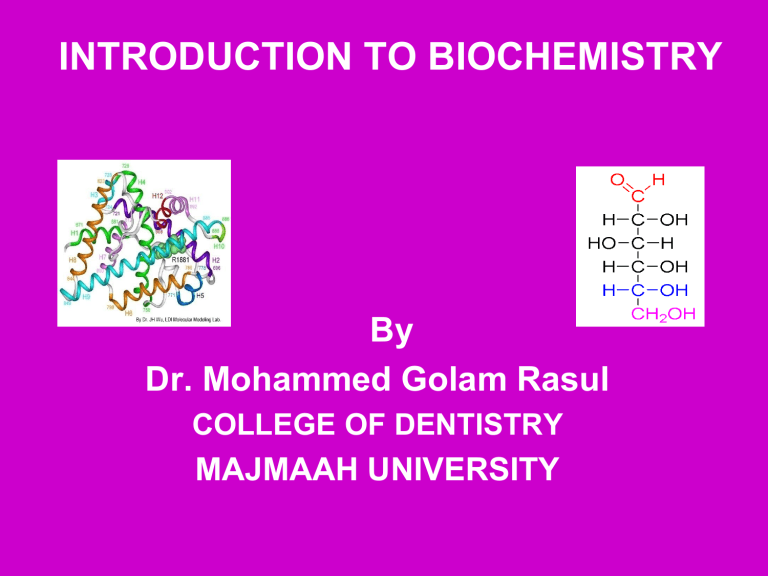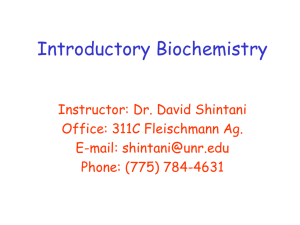INTRODUCTION TO BIOCHEMISTRY

INTRODUCTION TO BIOCHEMISTRY
By
Dr. Mohammed Golam Rasul
COLLEGE OF DENTISTRY
MAJMAAH UNIVERSITY
Introduction
• Biochemistry is the science concerned with the chemical basis of life.
• It is the application of the principles and methods of chemistry to the field of biology and physiology.
• It is the language of biology basic to the understanding of the different phenomena both in the biological and medical sciences.
Objectives
Upon completion of this course, students should be able to:
Define the basic constituents of macromolecules (carbohydrates, proteins, lipids, nucleic acids) and enzymes
Describe the classification, structure and functions of macromolecules and enzymes
Discuss the nutrition/ effects of nutrient deficiencies and their relationship to body structure
Demonstrate the ability to conduct basic biochemical laboratory test
Time-Table
Lecture : 1hr/week
• Sunday : 1pm – 2.00 pm
Practical: 3hrs/week
• Tuesday: 10 am– 1 pm
• Venue: Biochemistry Lab
Tutorials: 1 hr/ 3 week
Marks distribution for 1
st
semester
• Theoretical part ……………………….…………..………………50%
• Practical part ………….…..………………………………………50%
• Incourse assessments……………………………………….... 60%
• o Midterm written examination ……..…20%
• o practical assessments ………. ……..30%
• o Behavior and attitude ………..……….5%
• o Research ……………………………...2%
• o Home work …………………………...1%
• o Presentation …………………………..1%
• o Quiz….. ……………………………..…1%
• Final examination …………..…………………………………….40 %
• o Final practical examination …………10%
• o Final written examination ……………30%
What is Biochemistry?
• Biochemistry is a branch of medical science that seeks to describe the structure, organization and functions of living matter in molecular terms.
• It is the chemistry of life . It is divided into
3 principal areas:
• 1. Structural chemistry
• 2. Metabolism
• 3. Chemistry of molecular genetics
How does biochemistry impact you?
• Medicine
• Agriculture
• Industrial applications
• Environmental applications
A Knowledge of Biochemistry is essential to All Life Processes
• Physiology overlaps with biochemistry almost completely
• Pharmacology and pharmacy rest on sound knowledge of biochemistry in the creation of
“designer drugs” or drug architecture
• Invention of new drugs in Pharmacy, Medicine ,
Agriculture and other fields
• Biochemical approaches are employed in
Pathology
• Poisons act on biochemical reactions and this is the subject matter in toxicology .
Biochemistry in Relation to Dentistry
The aims, attitudes and techniques of biochemistry are as relevant to dentistry as to medicine or to any aspect of biology.
1.
To understand the true nature of dental disease .
All diseases have a biochemical basis.
2.
To give dental patients the necessary or appropriate dietary advice to prevent dental disease.
3.
Special relevance to dentists are areas of blood coagulation and effects of drugs and other injected substances on tissue and cells.
Biochemistry in Relation to Dentistry
4. Understanding the physicochemical process of resorption and deposition of bone minerals and its matrix is essential to orthodontics
5.As for the future, methods to prevent or cure tooth decay are likely to involve a biochemical approach, like caries vaccine .
What are Biomolecules
?
• Biomolecules are molecules found in living matter.
• Two broad types: Small molecules and macromolecules
• Importance of Macromolecules: a) Essential structures for the basis of life b) Control and regulate these processes c) Responsible for energy exchanges, irritability, metabolism, mobility and reproduction
Many Important Biomolecules are Polymers monomer lipids fatty acid polymer phospholipid supramolecular structure membrane proteins amino acid protein subunit protein complex carbo nucleic acids glucose nucleotide cellulose cell wall
DNA chromosome
monomer fatty acid polymer phospholipid supramolecular structure membrane
Lipids
Proteins
monomer amino acid polymer protein subunit supramolecular structure Enzyme complex
monomer glucose polymer cellulose supramolecular structure cell wall
Carbohydrates
Nucleic Acids
monomer nucleotide polymer supramolecular structure
DNA chromatin
Common theme:
Monomers form polymers through condensations
Polymers are broken down through hydrolysis.
Come to class!!!!!!
Try not to fall behind!!
• Review lecture notes.
www.m.rasul@mu.edu.sa
Next Meeting
• Basic Biochemical reactions
• Acid-Base relationship
